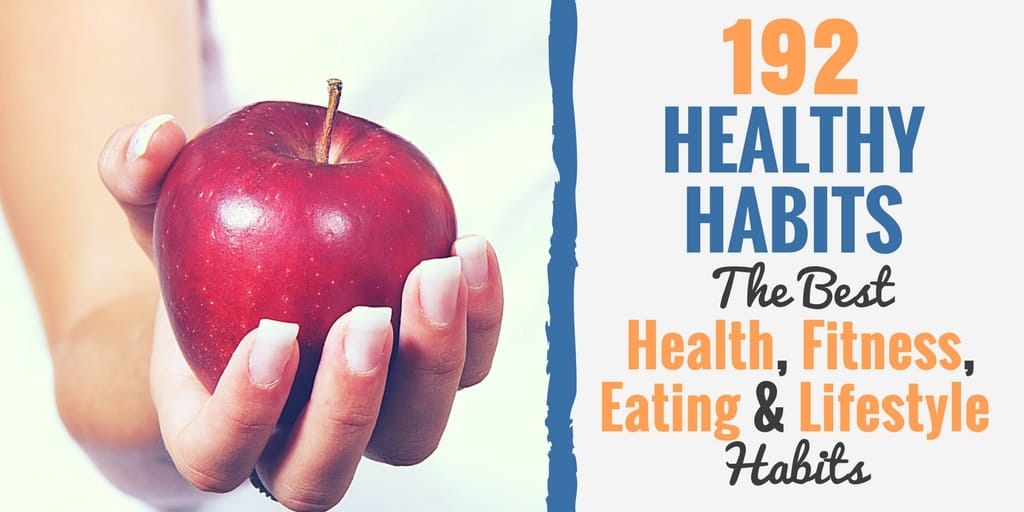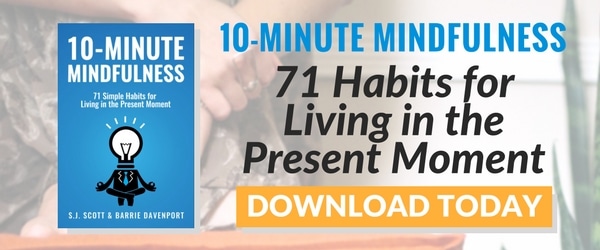
We have all heard that having healthy habits such as eating well, staying active, and staying on top of our health screenings is really important.
But have you ever really thought about why these things are so important, and how they all work together?
Healthy habits include anything that you do to benefit your physical, mental, or emotional well-being. When put together, these habits help create a framework for a healthy life.
If you are not used to living a healthy lifestyle, these habits can be difficult to develop, because you have to alter your mindset a bit and even change up your daily schedule.
However, if you are ready to become committed to improving your health, creating healthy habits can greatly benefit you in the long run.
No matter how old you are or how bad your former habits have been, you can move forward to improve them and create a better life for you.
It is important to remember that healthy habits can be created in stages. What might be an unhealthy habit for one person today may be a healthy habit for someone else.
For example, pretend you have an unhealthy habit of eating two bowls of ice cream every night. Cutting this down to one bowl or even just half a bowl is making progress towards the healthy habit of cutting down on unhealthy food. However, for someone who doesn't eat these foods to begin with, eating a bowl of ice cream a night would not be considered a healthy habit.
Start where you are and make progress towards habits that will be healthy for you.

If you have a health condition, it may not be healthy to start training for a marathon like it would be for an experienced runner. But you may be able to start going for daily walks to become more active.
In this list of 192 healthy habits, you will learn about eating better, exercising, and having an overall healthy lifestyle.
While some may not apply to all people, these habits are a great starting point for anyone who may be looking to better themselves.
Physical Activity (Fitness)
Getting physical activity benefits both your body and your mind. It helps keep your weight in control, fights off chronic diseases, reduces stress, improves your mood, and gives you a sense of accomplishment.
Getting physical activity does not have to involve hours at the gym. Instead, there are many ways that you can make small changes throughout the day to make your life less sedentary and get your body moving.
You can even involve your friends or family in your physical activity so you can have some time to interact with the people you love while also benefiting your body. There are so many types of physical activities that you could add to your day, it is just important to find one that you enjoy and stick with it.
1. Do housework.
2. Take 30-minute early morning walks.
3. Implement the two-minute walking habit for every hour that you sit.
4. Take the stairs instead of the elevator.
6. Use a treadmill desk.
7. Use a height-adjustable desk.
8. Aim for 10,000 steps a day. Wear a step-tracking device.
9. Take a dance break.
10. Go hiking more often.
11. Do yoga.
12. Go rock climbing.
13. Go geocaching.
14. Workout during TV commercials.
15. Do some Deskercise.
Forgiveness (Healthy Lifestyle)
While forgiveness may seem like an antiquated notion our rushed and quick-to-react society, there are many health benefits to it, even today.
When you are consciously able to let something go, even without an apology, it reduces your anger, stress, and tension.
The physical burden of feeling hurt takes a toll on the body, so being able to release those negative feelings and replace them with positivity is a healthy habit.
Choosing to not forgive someone increases your anger and contributes to a feeling of loss of control. Holding onto a grudge can increase muscle tension, heart rate, and blood pressure, which are all harmful to your health.
Being able to forgive someone will also improve your sleep. You will not spend time lying in bed at night ruminating over something that happened in the past, or planning what kind of retaliation you want to make. If you can meditate and fully forgive someone else, you can focus more on you and your own well-being.
Finally, being able to forgive can strengthen your relationship with your friends and family. Avoiding deep-seeded strains in close relationships is an important part of feeling connected to those around you and living life in harmony with people who cross your path. Maintaining healthy relationships is a key component of living a healthy lifestyle.
16. Don't go to sleep angry.
17. Focus on understanding yourself instead of blaming others.
18. Live in the present instead of being stuck in the past.
19. Do it for yourself and your own peace of mind.
20. Remember the times when you were forgiven.
21. Remember people when they were children.
22. Remember why you love people.
23. Remember that it's better to be kind instead of right.
24. Observe, don't judge.
25. Take responsibility for your own shortcomings.
26. Acknowledge your growth from the experience.
Sometimes, it isn't what you eat, but how much of it you are eating.
For example, avocados are extremely healthy and have a lot to offer in terms of nutrients and healthy fats. However, they are very dense in calories, so eating three avocados per day would not be a healthy habit.
Eat until you are physically satisfied, and then stop. If you think you may still be hungry, wait 20 minutes, drink a glass of water, and reconsider if you really need another helping.
Also, start eating on smaller plates so you feel as if your plate is full before you sit down to a meal. You will probably be surprised at the amount of food that actually accounts for a serving size.
Remember that eating is not a pastime or something to do when you are bored or stressed out. Make sure you are mindfully eating when it is time to do so, and that you sit down and only focus on your food.
Mindlessly eating in front of the television or running to the refrigerator if you have had a bad day are both bad eating habits that cause further health problems down the road.
27. Avoid eating when feeling stressed.
28. Use portion-control containers to store your meals.
29. Use portion-control plates when eating at home.
30. Listen to your hunger cues.
31. Drink plenty of water and healthy fluids.
32. Keep a food diary or journal.
33. Make and drink healthy smoothies.
34. Learn how to read nutrition labels.
35. Stay away from fun-size candy bars and other treats.
36. Plan your meals every week.
37. Make your own single-serving snack packs.
38. Limit distractions during meal times.
39. Stick to your grocery list.
40. Take smaller bites and eat slowly.
41. Chew your food at least five times before swallowing.
42. Drink before you get thirsty.

Preventive Health Care Screening
People tend to go to the doctor when they become ill, or when an unfamiliar symptom pops up. From there, the doctor works with the patient to treat the problem in hopes that it will go away. But what if the problem never happened in the first place?
For example, if you notice a small mark on your skin that has seemingly popped up out of nowhere and you don't know what it is, this could be a sign of skin cancer that can rapidly spread throughout your body. Don't ignore these things and hope they will go away. Instead, be proactive and visit a dermatologist every year to get checkups so they can look over your skin for anything that they may find suspicious.
It is important to be proactive about your health, regardless of if you are sick or not. Doctors may give advice on preventative measures for diseases that run in your family, or even just catch a health problem before it becomes too late. Catching health issues early is the key, so make sure that you are paying attention to your physical health no matter how you actually feel.
43. Annual physical exam.
44. Thyroid test (for women only).
45. Bone mineral density test (women).
46. Mammogram (women).
47. Colonoscopy.
48. Fasting plasma glucose test.
49. Eye exam.
50. Hearing test.
51. Dental exam and cleaning.
52. Abdominal aortic aneurysm screening (for men only).
53. Blood pressure screening.
54. Cholesterol screening.
55. Prostate screening (men).
56. Lung cancer screening.
57. Testicular self-exam (men).
58. Pap test and HPV test (women).
59. Chlamydia test (women).
60. Gonorrhea test (women).
61. HIV test and other sexually transmitted infection tests.
62. Skin exams.
63. Influenza (flu) vaccine.
64. Hepatitis A vaccine.
65. Hepatitis B vaccine.
66. Herpes zoster vaccine.
67. Human papillomavirus (HPV) vaccine.
68. MMR (measles, mumps, rubella).
69. Meningococcal (meningitis).
70. Pneumonia vaccine.
71. Tetanus, diphtheria, pertussis.
72. Varicella (chicken pox).
- Physical exam: Every two to three years for men 18 and over.
- Colonoscopy: Every 7-10 years for men 50 and over.
- Eye exam: One before the age of 30, as recommended by a doctor after age 40, every one to two years after age 65.
- Hearing test: Once every 10 years for men ages 18-50, once every 3 years for men 51 and over.
- Dental cleaning: Twice a year for men over 18.
- Blood pressure screening: Every two years after the age of 18.
- Cholesterol screening: Every five years starting at age 35.
- Prostate screening: Beginning at age 50.
- Skin exam: Yearly, beginning at the age of 18.
Schedule for women
- Physical exam: Annual.
- Bone mineral density test: Beginning at age 65.
- Mammogram: Every one to two years starting at age 40.
- Clinical breast exam: Every three years for women who are 20-40.
- Colonoscopy: Every 7-10 years for women 50 and over.
- Fasting plasma glucose test: Every three years beginning at age 45.
- Eye exam: One before the age of 30, as recommended by a doctor after age 40, every one to two years after age 65.
- Dental cleaning: Twice a year for women over 18.
- Blood pressure screening: Every two years beginning at the age of 18.
- Cholesterol screening: Every five years starting at age 35.
- Pap test: Every three years for women ages 21-29, every five years for women 30-65, testing may be discontinued at age 65 if no previous problems have occurred.
- Skin exam: Yearly after the age of 18.
Sleep plays a very important role in maintaining general well-being and a healthy lifestyle. Getting enough deep sleep at night can help protect your mental and physical health, your overall quality of life, and your safety.
How you feel while you're awake is greatly dependent on the quality of sleep you are getting at night. While you are sleeping, your body is replenishing itself to support healthy brain function and optimize your physical health. Sleep also plays a large role in the growth and development of children.
Sleep deficiency can happen both quickly and over time. If you are losing sleep on a regular basis, you may raise your risk for chronic health problems, experience trouble thinking during the day, have delayed reactions, have poor performance at work, experience learning difficulties, and have problems developing relationships.
If you do not give your body a chance to restore itself from expending energy all day and prepare itself for the energy you will need the following day, your health will certainly suffer.
73. Avoid caffeine in the afternoon.
74. Avoid heavy meals close to bedtime.
75. Keep your pets out of the bed.
76. Be consistent in your sleep schedule.
77. Don’t drink too many fluids before bed.
78. Quit smoking.
79. Set your room temperature between 60-67 degrees F.
80. Shut off electronics at least an hour before bed.
81. Wear socks.
82. Get spiritual.
83. Visualize. Think happy thoughts.
84. Keep a sleep log.
85. Have a wind-down sleep routine.
86. Learn how to get back to sleep.
87. Make sure that the room is dark and quiet.
88. Use an essential oil diffuser with the right essential oil for sleep.
Try Something New (Healthy Lifestyle)
Everyone gets into a typical routine where they do the same thing pretty much every day. However, there are many ways to mix up your schedule a bit so you can try new things. Changing your routine will help you challenge yourself and learn new things.
If you are hesitant at first, you may end up surprised at how much you enjoy your new activity or the new people you meet. Trying new things will lead to increased confidence and a higher level of self-esteem, while also reducing boredom and loneliness. This will help drive your personal growth, improve your health, and increase longevity.
89. Learn a new language.
90. Watch a foreign language film (with subtitles, of course).
91. Try eating at a new restaurant. Let the waiter pick out your meal.
92. Travel to somewhere you've never been before.
93. Sign up and attend a class related to your work.
94. Try a new sport.
95. Cook a easy meal you've never tried before.
96. Take a different route to work, or get there in a new way.
97. Take a road trip.
98. Try a new look.
99. Listen to a new (to you) genre of music.
100. Read a book from an author you've never heard of.
101. Try a new form of exercise.
102. Watch a new play or musical.
103. Watch a drag show.
104. Go one week without Internet.
105. Go one weekend without spending.
Strength and Flexibility (Fitness)
Your muscles naturally lose strength and decrease in size with age. They will likely also become less supple and stiffer. These changes can affect your range of movement in your joints and cause you to lose tissue elasticity, which will lead to tight muscles.
One of the main reasons that muscles begin to weaken and lose flexibility is inactivity. Without doing strength-building and flexibility exercises, the loss of flexibility may lead to permanent damage in your posture and loss of healthy muscle function. It is therefore imperative to maintain muscle flexibility as an important component of overall fitness.
Having flexible muscles helps to reduce any soreness in your body, and to improve your posture. Stretching can also improve your muscular balance by realigning the tissues in your body, which will reduce the effort that is needed to maintain balance. With strong muscles and flexibility, you will have a decreased risk of injury and a greater range of motion.
Finally, practicing these healthy habits will increase the blood and nutrients that are delivered to the tissues throughout your body. This is because, when you stretch, you are increasing the temperature of your tissues, which then increases your circulation and the transportation of nutrients.
106. Pushups.
107. Crunches.
108. Curl to press.
109. Fly to tris.
110. Lying march.
111. Ball squat.
112. Dips.
113. Tripod row.
114. Shoulder and chest.
115. Arm across chest.
116. Triceps stretch.
117. Glute stretch.
118. Adductor stretch.
119. Single leg hamstring.
120. Standing quadriceps.

Laugh (Healthy Living)
Some researchers believe that laughter really might be the best medicine, because it can help you feel better and reduce stress. Having a positive attitude, being open to letting loose, and having a good sense of humor will also help you to develop relationships with other people and form strong bonds.
Studies have actually found that when people laugh, their brains go through the same changes that they do when people are mindfully meditating. This makes people feel refreshed and ready to conquer problems that they run into throughout the day. The therapeutic value of laughter is still being studied, but so far, it has only shown positive results.
121. Learn the therapeutic benefits of laughter.
122. Commit to laughing more.
123. Watch silly TV shows and movies.
124. Consider checking out a laughter yoga club.
125. Join a laughter-based exercise program.
126. Engage in voluntary, self-initiated laughter.
127. Schedule time to watch funny videos on YouTube.
128. Spend more time with your pets.
129. Read funny books or newspaper comics.
130. Have a favorite comedian.
131. Watch a stand-up comedy show live or on YouTube.
132. Listen to funny podcasts.
133. Meet up with old friends and reminisce.
134. Visit an amusement park.
135. Look at your old pictures.
Family and Friends (Healthy Lifestyle)
We are not created to live alone. We are born with our mothers, and quite possibly other surrounding family members. Throughout various stages of life, we depend on other people to help us accomplish things along the way.
In order to do most anything, you have to have some sort of cooperation of other people. Humans have evolved to cooperate in order to survive. Having both family and friends that you can rely on, turn to, and socialize with will give you a sense of belonging and allow you to relate to people who share your values and beliefs.
A very important part of self-care is to make it a priority to develop and maintain human relationships. Sometimes it takes effort during our busy lives to keep in touch with all of our loved ones, but it is a very healthy habit to do so.
136. Make it a point to eat dinner together as a family.
137. Schedule a weekly family night.
138. Schedule yearly family vacations.
139. Exercise, do chores, and play together.
140. Read bedtime stories to young kids, and share books with older ones.
141. Keep and continue to grow your family photo albums.
142. Get to know your children's friends.
143. Help your kids with homework.
144. Go camping together.
145. Bring your kids to school.
146. Leave love or encouraging notes.
147. Work on common goals with (a) friend(s). Be each other's accountability partner.
148. Host a sleepover.
149. Plan a reading date with your friend(s).
150. Help your friends with chores.
151. Meet up with friends for lunch at least once a month.
Address Addictive Behaviors
When you think about the word "addiction," you may only think of alcohol, tobacco, and drug use.
However, there are other behaviors that may be healthy in moderation, but that can end up becoming addictions. Things like food, caffeine, Internet usage, and gambling can all become addictive for some people.
There are safe levels for these types of behaviors, and we need to recognize and address our habits in order to know when they are in excess. It is important to consider your personality when doing this. Studies have shown that there are connections between impulsiveness, compulsiveness, and addiction.
You have to be able to self-reflect to see if you have any repetitive behaviors that you do without a rational motivation.
A full-blown addiction occurs when you have an inability to stop a harmful behavior even though it has negative consequences. If you see a problem, it is important to act to address the issue.
152. Start by admitting that you have a problem.
153. Understand the consequences of your addictive behavior.
154. Assess how bad your addictive behavior is.
155. Know and consider your personality.
156. Discover what's driving the behavior.
157. Understand your habit loop. Identify your triggers. Learn how to break bad habits.
158. Engage in a new, different routine that disrupts your addictive behavior.
159. Keep an accountability journal. (like the Freedom Journal)
160. Reward yourself.
161. If you feel you need professional help, consider seeing a therapist.
Quiet Your Mind (Healthy Living)
Taking some time out of the day to quiet your mind and meditate is a great way to reduce stress. It can help you connect your body with your mind and release any built-up tension from things that are happening in your personal or professional life.

This will also give you a chance to reflect on anything going on in your life, and accept or deal with problems that have been keeping you from being successful or achieving your goals. Your mind needs rest throughout the day so it can be ready to take on the next task that comes your way.
162. Practice a morning breathing exercise.
163. Create an “if-then” plan for times when monkey mind starts to get the better of you.
164. Practice morning meditation.
165. Practice shower meditation.
166. Be an observer of your own thoughts.
167. Practice pranayama.
168. Practice qigong.
169. Start a journal or write your "morning pages."
170. Create a tea or coffee ritual.
171. Practice yoga.
172. Recite mantras or positive affirmations.
173. Build focus.
174. Practice mindful eating.
175. Take a digital break regularly.
176. Take a music break.
Gratitude (Healthy Living)
Reminding yourself what you are grateful for each day will help keep your spirits up and fend off any lingering depression. Focus on the positives in your life rather than the negatives, and keep your strengths in mind as you start each day.
Making this deliberate point of being thankful for everything you have in your life is beneficial for your happiness and overall well-being. Sometimes we forget the small things that we take for granted every day that we actually wouldn't know what to do without.
178. Keep a gratitude journal.
179. Give at least one compliment every day.
180. Always say thank you.
181. Say grace before meals.
182. Each morning, think of at least three things you are grateful for.
183. Smile more often.
184. Volunteer for organizations or causes you believe in.
185. Call a friend or relative and thank them for being a part of your life.
186. Make a gratitude collage.
187. Appreciate nature.
188. Listen actively when someone else is talking.
189. Write and send a thank you note.
190. "Look for the helpers." - Fred Rogers
191. Be thankful when you learn something new.
192. Reward effort.
When you practice healthy habits, you increase your chances of living a longer and healthier life. Even if you start small, you can significantly reduce your chances of developing a chronic disease or dying prematurely compared with those who practice only unhealthy habits.
Bad habits may certainly be difficult to break, but once you are able to get in the routine of practicing healthy habits, you will not regret your decision to make the effort. While your behavioral changes may not occur overnight, it is important to be patient and take small steps one day at a time.
Be kind and share this list of healthy habits with friends and family!
I hope you enjoyed this extensive list of healthy habits. I hope you are not daunted by the sheer number of tasks required to live a healthy lifestyle. It is a lot, but we do not need to be 100% perfect all the time.
If you recognize the importance of these healthy habits and do your personal best to incrementally improve you are leagues ahead of those who have no idea what healthy living is all about.
Please comment on your favorite healthy habits in the comments below. Also share any additional healthy habits you feel are important to healthy living in the comments below.
As always, please share this healthy habit/ healthy living post on your favorite social network to spread this to as many people as possible. Thanks!

Original article and pictures take www.developgoodhabits.com site
Комментариев нет:
Отправить комментарий